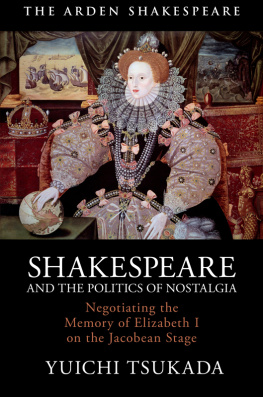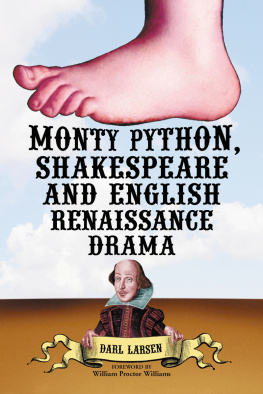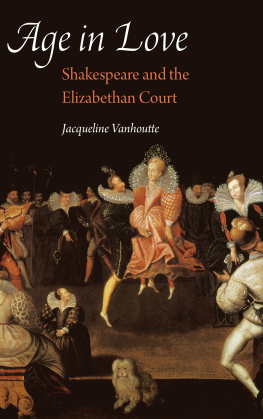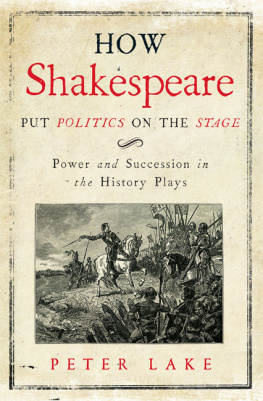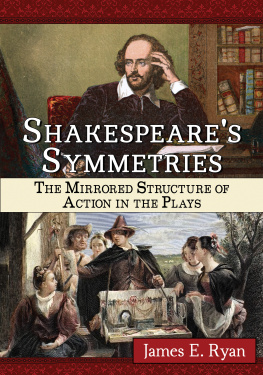Shakespeare
and the Politics
of Nostalgia
RELATED TITLES
The Arden Introduction to Reading Shakespeare
Jeremy Lopez
ISBN 9781472581020
Performing Shakespeares Women: Playing Dead
Paige Martin Reynolds
ISBN 9781350002593
Playing Indoors: Staging Early Modern Drama in the Sam Wanamaker Playhouse
Will Tosh
ISBN 9781350109506
Shakespeare: Actors and Audiences
Fiona Banks
ISBN 9781474257930
Shakespeare and the Gods
Virginia Mason Vaughan
ISBN 9781474284271
Shakespeares Pictures: Visual Objects in the Drama
Keir Elam
ISBN 9781350106109
Shakespeare
and the Politics
of Nostalgia
Negotiating the Memory
of Elizabeth I on the
Jacobean Stage
Yuichi Tsukada

I would like to thank Gordon McMullan for all his support and encouragement and Martin Butler, Sarah Dustagheer, Helen Hackett, Lucy Munro and Ann Thompson for their invaluable comments on the earlier drafts of this book. Any faults that remain, however, are entirely my own. I am also grateful to Margaret Bartley, Lara Bateman and Mark Dudgeon at The Arden Shakespeare and to the anonymous readers who reviewed and offered insightful comments on my submission to the publisher. Shorter and earlier versions of appeared in my short essay collected in Shakespeare and Theatre Culture (Tokyo: Kenkyusha, 2012). I would like to thank the journal and the publisher for giving me the opportunities to test out my initial thoughts on Jacobean Shakespeare and for their permission to use substantially revised versions of my essays.
Dates of first performance are provided in round brackets after each play is named. They are based on a variety of sources and these sources are discussed in the endnotes. Where no sources are mentioned, dates are taken from Alfred Harbage, Annals of English Drama, 9751700, 3rd ed., rev. Samuel Schoenbaum and Sylvia Stoler Wagonheim (London: Routledge, 1989). Primary works have been quoted as they appear in the editions cited. When quoting directly from early modern texts, however, I have modernized the long s () throughout. All quotations from Shakespeare refer to the Arden Shakespeare Third Series editions.
At the climax of William Shakespeare and John Fletchers Henry VIII (1613), trumpets sound and a child richly habited in a mantle (5.4.0 SD) appears on stage. Under a canopy borne by four noblemen, the infant, who has just been christened, is carried by her godmother the Duchess of Norfolk. The train of noblemen and women pass once about the stage (5.4.0 SD) as if they intend to display the infant to the audience in the manner of a pageant. When the march is over, Garter delivers a speech, pronouncing, for the first time in the play, the name of the infant who is at the centre of this pageantry:
GARTER
Heaven, from thy endless goodness, send prosperous life, long and ever happy, to the high and mighty Princess of England, Elizabeth.
(5.4.13)
Henry VIII then appears on stage and, as if to reconfirm the infants identity for the audience, asks Thomas Cranmer to pronounce her name once again before blessing her:
KING
What is her name?
CRANMER Elizabeth.
KING Stand up, lord.
[to the child] With this kiss, take my blessing. God protect thee,
Into whose hand I give thy life.
CRANMER Amen.
(5.4.911)
This scene has long been seen as a rare instance of Shakespeares involvement in the commemoration of Elizabeth I, who died in 1603. Many studies in the past attempted to seek evidence of Shakespeares connection with Elizabeth in those of his plays that were performed during her reign, often citing Oberons reference to a fair vestal, throned by west (2.1.158) in A Midsummer Nights Dream (1596) and the Choruss address to our gracious Empress (5.0.30) in Henry V (1599) as instances. Yet Elizabeth has been markedly absent from studies of Shakespeares Jacobean plays. This may even be the case at this moment in Henry VIII since attribution studies suggest the final scene may have been written not by Shakespeare but by his collaborator Fletcher but equally it can be argued that, since Shakespeare chose to collaborate on a play about the reign of Henry VIII that leads steadily to the baptism of Elizabeth, the plays political nostalgia can hardly be handed solely to the other half of the collaboration. The Jacobean Shakespeare has been generally regarded as a playwright who, once the queen died, quickly shifted his attention to his new monarch and patron James I, composing plays that satisfied Jamess interests, for example, in his Scottish ancestry, witchcraft and Britains Roman origin.
Indeed, Shakespeare did not publicly comment on the death of Elizabeth. Many poets composed elegies upon her death; as Henry Petowe puts it in his collection of elegies for Elizabeth, Elizabetha Quasi Viuens (1603), each modern Poet that can make a verse / Writes of Eliza, euen at their Muses birth. The public expectation for Shakespeare to react to Elizabeths death was certainly high; A Mournful Ditty Entitled Elizabeths Loss (1603), a single-sheet ballad, calls for Shakespeare to contribute to this national mourning:
You Poets all braue Shakspeare, Iohnson, Greene,
Bestow your time to write for Englands Quene.
Lament, lament, &c.
Returne your songs and Sonnets and your sayes:
To set foorth swete Elizabeths praise.
Lament, lament, &c.
However, Shakespeare did not publish such an elegy. Henry Chettle noted his silence and rebuked him in Englands Mourning Garment (1603): Nor doth the siluer tongued Melicert [Shakespeare], / Drop from his honied Muse one sable teare / To mourne her death that graced his desert. In fact, Shakespeare might have made one obscure reference to Elizabeth in his Sonnet 107, which was published in 1609:
The mortal moon hath her eclipse endured,
And the sad augurs mock their own presage;
Uncertainties now crown themselves assured,
And peace proclaims olives of endless age.
Although it has been argued that the eclipsed moon refers to the death of Elizabeth, the Jacobean dating of the sonnet remains debatable. Even if the mortal moon does refer to Elizabeth, the sonnet does not say anything meaningful about Elizabeth or her reign. Shakespeare is not actually lamenting the death of Elizabeth; he is merely referring to the transition of time by using the language associated with Elizabeths reign (mortal moon) and Jamess (peace; olives). Perhaps the fact that Shakespeare did not eulogize Elizabeth and seemed to distance himself from the dead queen has discouraged critics from probing into Shakespeares interaction with the memory of Elizabeth and her reign. Shakespeares Jacobean plays with the exception of Henry VIII and Antony and Cleopatra (as we will see, Shakespeares Cleopatra has been read, if uncritically and inappropriately, as a personation of Elizabeth) have not been seen as related to the cultural phenomenon of nostalgia.
Shakespeare and the Politics of Nostalgia is the first book-length study that seeks to illuminate the relationship between Shakespeares Jacobean drama and the phenomenon of nostalgia for Elizabeth in the specific political contexts of the first decade of the reign of James I. In this book, I will contest the premise that Shakespeare remained silent about Elizabeth in the first decade of Jamess reign. Although the memory of Elizabeth recurred in other forms of discourse throughout this period, his pre-1613 drama has not been sufficiently examined against this cultural undercurrent. I seek to redress this critical oversight by resituating four Shakespearean plays composed between 1606 and 1610
Next page
